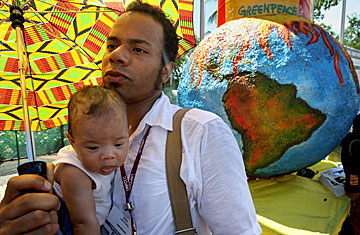
A delegate at the UN Climate Change Conference carries his child as he watches a demonstration at the venue of the meeting on Bali.
(2 of 2)
WHO WON
After years of essentially rolling over against the Bush Administration on climate change, the EU showed surprising spine. A mid-week threat led by Germany to boycott the upcoming major emitter' conference — a Bush initiative that would bring together the world's biggest economies to talk about climate change helped defuse American intransigence, and made the roadmap stronger than it would have otherwise been.
But the clear big winners are China and India, which have fully arrived as major players on international climate action. China in particular came to Bali ready to negotiate hard, but also prepared to give something — a vital change after years of insisting that it would take no responsibility for climate change. While India began the negotiations seemingly disengaged, the country elevated its game in the final day, and showed that it was willing to go beyond its own narrow national interests. That was the case for the developing world as a whole, which stood up to the U.S. without scuttling the possibility of a future deal. "The developing countries allowed this discussion to begin in a whole new way," says David Doniger, policy director for the Natural Resource Defense Council's climate center.
— WHO LOST
It should be difficult for a country to make the final concession that allows a landmark deal to fall into place, and still appear selfish and churlish — but the U.S. somehow managed to do that. Years of blocking climate action at every turn meant the Bush Administration came into the Bali talks with little public credibility, and while there was a sense before the talks that the U.S. might show flexibility, that hope was quickly dispelled. Throughout the negotiations the U.S. — with help, at least until the last night, from Canada, Australia and Japan — blocked attempts to make climate diplomacy match the urgency of climate science. "The U.S. needed to come in here and build up its credibility," says Kevin Knobloch, president of the Union of Concerned Scientists. "Instead, they just burnished their Darth Vader image."
— WHAT'S NEXT
That's the real question. The roadmap outlines the next steps for negotiation, and calls for a deadline of 2009 — in time to have a formal successor to the Kyoto Protocol. But as tortuous as Bali was, the next round — which will have to tackle the specific actions to be taken by developed and developing nations alike will be even more difficult. Even as they accepted the Bali text, representatives from developing nations repeatedly emphasized that their top priority remained economic development. That means more power and — for now — more carbon. While there is finally political will in the U.S. for domestic carbon caps, there is still a wide gulf between what is likely acceptable to Americans, and the more aggressive cuts the Europeans will push.
But at least we all seem to be headed in the same direction, if not at the same speed. "This is not an issue between the developed world and the developing world," said Narain Meena, India's Minister of State for the Environment and Forests. "This is a global issue. The challenges are huge. The task is huge."
An earlier version of this story attributed a quote in the final paragraph to Rona Ambrose, India's environment minister. The quote was actually from Narain Meena, India's Minister of State for the Environment and Forests.